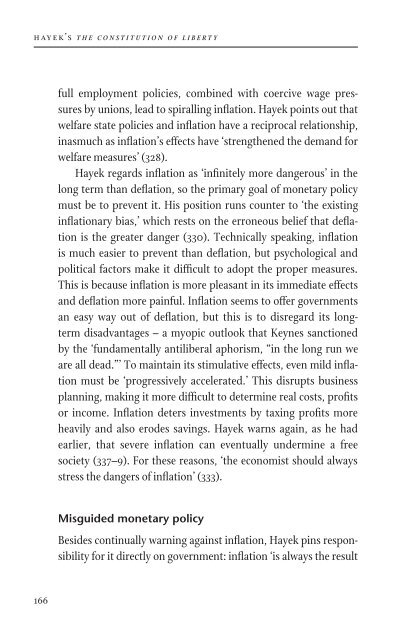Hayek's The Constitution of Liberty - Institute of Economic Affairs
Hayek's The Constitution of Liberty - Institute of Economic Affairs
Hayek's The Constitution of Liberty - Institute of Economic Affairs
Create successful ePaper yourself
Turn your PDF publications into a flip-book with our unique Google optimized e-Paper software.
h ay e k ’ s t h e c o n s t i t u t i o n o f l i b e r t y<br />
p r e v e n t i n g i n f l a t i o n<br />
full employment policies, combined with coercive wage pressures<br />
by unions, lead to spiralling inflation. Hayek points out that<br />
welfare state policies and inflation have a reciprocal relationship,<br />
inasmuch as inflation’s effects have ‘strengthened the demand for<br />
welfare measures’ (328).<br />
Hayek regards inflation as ‘infinitely more dangerous’ in the<br />
long term than deflation, so the primary goal <strong>of</strong> monetary policy<br />
must be to prevent it. His position runs counter to ‘the existing<br />
inflationary bias,’ which rests on the erroneous belief that deflation<br />
is the greater danger (330). Technically speaking, inflation<br />
is much easier to prevent than deflation, but psychological and<br />
political factors make it difficult to adopt the proper measures.<br />
This is because inflation is more pleasant in its immediate effects<br />
and deflation more painful. Inflation seems to <strong>of</strong>fer governments<br />
an easy way out <strong>of</strong> deflation, but this is to disregard its longterm<br />
disadvantages – a myopic outlook that Keynes sanctioned<br />
by the ‘fundamentally antiliberal aphorism, “in the long run we<br />
are all dead.”’ To maintain its stimulative effects, even mild inflation<br />
must be ‘progressively accelerated.’ This disrupts business<br />
planning, making it more difficult to determine real costs, pr<strong>of</strong>its<br />
or income. Inflation deters investments by taxing pr<strong>of</strong>its more<br />
heavily and also erodes savings. Hayek warns again, as he had<br />
earlier, that severe inflation can eventually undermine a free<br />
society (337–9). For these reasons, ‘the economist should always<br />
stress the dangers <strong>of</strong> inflation’ (333).<br />
Misguided monetary policy<br />
Besides continually warning against inflation, Hayek pins responsibility<br />
for it directly on government: inflation ‘is always the result<br />
<strong>of</strong> the weakness or ignorance <strong>of</strong> those in charge <strong>of</strong> monetary policy<br />
– though the division <strong>of</strong> responsibility may be spread so wide that<br />
nobody is to blame’ (295). Much <strong>of</strong> the present chapter is devoted<br />
to ways <strong>of</strong> maintaining a stable monetary system – one that can<br />
reasonably expect to achieve ‘a high and stable level <strong>of</strong> employment’<br />
as well as ‘the stability <strong>of</strong> some comprehensive price level’<br />
(337).<br />
One option would be to deprive governments <strong>of</strong> their control<br />
over monetary policy and rely on spontaneous market forces to<br />
correct inflation and deflation. <strong>The</strong> market-only option, while<br />
perhaps feasible at one time, is no longer practicable or even<br />
desirable, and this is for three reasons: first, the need for a central<br />
agency to control rapid and disruptive changes in the relative<br />
supply <strong>of</strong> money or the demand for it (money is ‘a kind <strong>of</strong> loose<br />
joint in the otherwise self-steering mechanism <strong>of</strong> the market,’<br />
hindering any direct return to a new equilibrium); second, the<br />
need to deal with spontaneous fluctuations in the supply <strong>of</strong> money<br />
resulting from ‘the interacting money and credit systems;’ and<br />
third, the need to take account <strong>of</strong> government’s financial policy,<br />
which necessarily dominates monetary policy in an era <strong>of</strong> massive<br />
expenditures. It is thus inevitable, under modern conditions, that<br />
control <strong>of</strong> monetary arrangements ‘should be largely exercised by<br />
governments’ (325; cf. 324–7; see Hayek, 1941 [2007a]: 367).<br />
Having argued that the money supply should be controlled<br />
by some government agency, Hayek must now decide how much<br />
discretion to allow it. One possibility is to impose some mechanical<br />
rule that aims for long-term monetary stability but ties the<br />
agency’s hands in the short term and insulates it from political<br />
pressures. Some economists have advocated restrictive rules <strong>of</strong><br />
this kind. Others would require that currency be convertible into<br />
166<br />
167












